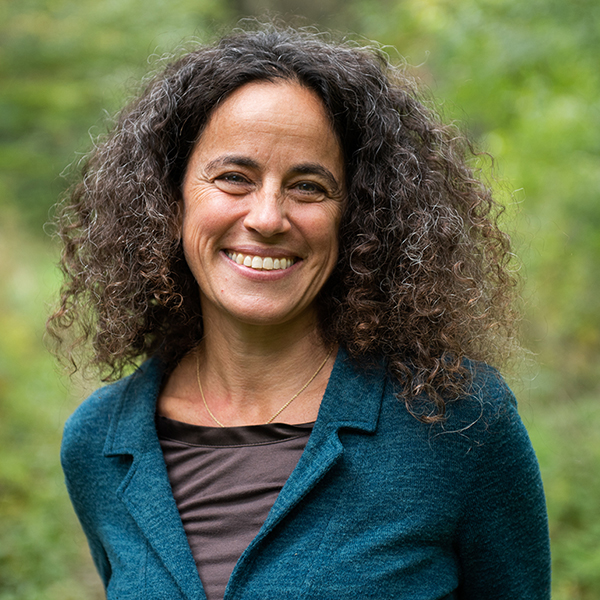Erica Moodie’s enthusiasm for statistics might sway even the biggest skeptic – she frequently uses the word ‘fun’ when describing her work.
“Usually when I tell people what I do, not always, but sort of four times out of five, I get ‘Uhhh, statistics was my least favourite class,’” Moodie, an associate professor of biostatistics at McGill, recounts with a laugh.
She paints statistics in a much more compelling light – “I think it’s super fun and really interesting” – and very relevant in our daily lives.
Media constantly report on studies, “so being able to understand how those data were collected, whether it makes sense to draw the conclusions they’re drawing” is important, she suggests.
Another persuasive argument for the usefulness of statistics would be Moodie’s own research.
A biostatistician and leader in her field, Moodie focuses on developing reliable statistical methods for precision medicine, which promotes a more tailored approach to treatment that takes into account differences among patients.
Her research involves trying to identify the best sequences of treatments for patients – “We almost think of these as rulebooks for how we would treat people over time,” she says. To that end, she develops estimation tools – “finding ways of learning from real data what these treatment strategies should be.”
For example, Moodie is collaborating with a researcher in the United States on an upcoming study that will use electronic health records from routine care to look at drug treatments for depression to try to find optimal sequences. “So, what’s the best antidepressant to start with … If it doesn’t work, what should you try next,” she says.
She has also worked with a bone marrow transplant doctor examining what is the best course of immunosuppresants to try prior to the transplant to avoid Graft Versus Host Disease – and for patients who get the disease, what immunosuppressants should be tried next.
In certain areas, especially with chronic diseases, there’s a lot of heterogeneity in the way patients respond, and also within a given patient over time, Moodie explains. They may develop a tolerance for a drug and need a change in dosage or a new medication.
“There’s a lot of variability and it’s trying to find a principled, evidence-based way of coming up with rules for how we should adapt treatment to the individual. So that’s the motivating health side of it.”
On the statistical side, trying to come up with good methods to figure out what these rules are is “really tricky” and challenging, Moodie says. “But then it feels like the ultimate aim is something very practical and real world.”
At spring convocation, Moodie, a William Dawson Scholar, was one of three McGill professors to receive the Principal’s Prize for Outstanding Emerging Researchers.
“For years, she was the only statistical methodologist working on estimation and inference for precision medicine in Canada,” Vice-Principal (Research and Innovation) Martha Crago, BA’68, MSc(A)’70, PhD’88, said at the ceremony. Thanks to Moodie’s training efforts, there are now several Canadian researchers in this area, Crago said.
“Many of her colleagues have praised the breadth and depth in her scholarly activities. In her contributions to generating new knowledge, she is recognized worldwide as an expert in her field,” Crago added.
A Winnipeg native, Moodie’s close-knit family includes three other biostatisticians: Her mother, sister, and brother-in-law. (What are the odds?)
Her husband, David A. Stephens, chair of McGill’s Department of Mathematics and Statistics department, is also a statistician.
“My dad sort of rolls his eyes [at family get-togethers] if the discussions get pretty boring,” Moodie laughs. (He’s a zoologist and retired academic.)
Moodie received the Department of Epidemiology, Biostatistics and Occupational Health’s Faculty Mentorship Award in 2017, and says she enjoys helping someone realize their potential. She makes a point of mentioning that she had wonderful mentors along the way, including McGill colleague Rebecca Fuhrer, then the department’s chair, who hired her.
Moodie became inspired to work in precision medicine because of a seminar she attended as a graduate student where a statistician spoke about her own work in that area. Moodie recalls thinking “this is where medicine should be going. This is where statistics should be going. This is the future.”
She sees statistics as “sort of the messy counterpart to mathematics” because real data is error prone and “noisy” and patients don’t always comply with their treatments.
There’s a low-tech component to her research – she sits down with a pen and pencil to work out theoretical derivations for large sample properties, then codes it on her computer to see if it works.
Using ever-bigger registries, such as provincial electronic health records, is where the statistical methods side of precision medicine is going, according to Moodie, who notes that these types of data sources provide “unprecedented opportunities to learn about treatment tailoring.”
However, they are data sets that weren’t built for research purposes, “so there’s information that you really want that isn’t in them.”
She calls these non-experimental data sources a good starting point, but says proposed tailored treatment strategies would need to be tested in a more conventional way, such as a clinical trial.
“There are huge volumes of data, I think, that we’re only just beginning to dig into.”


